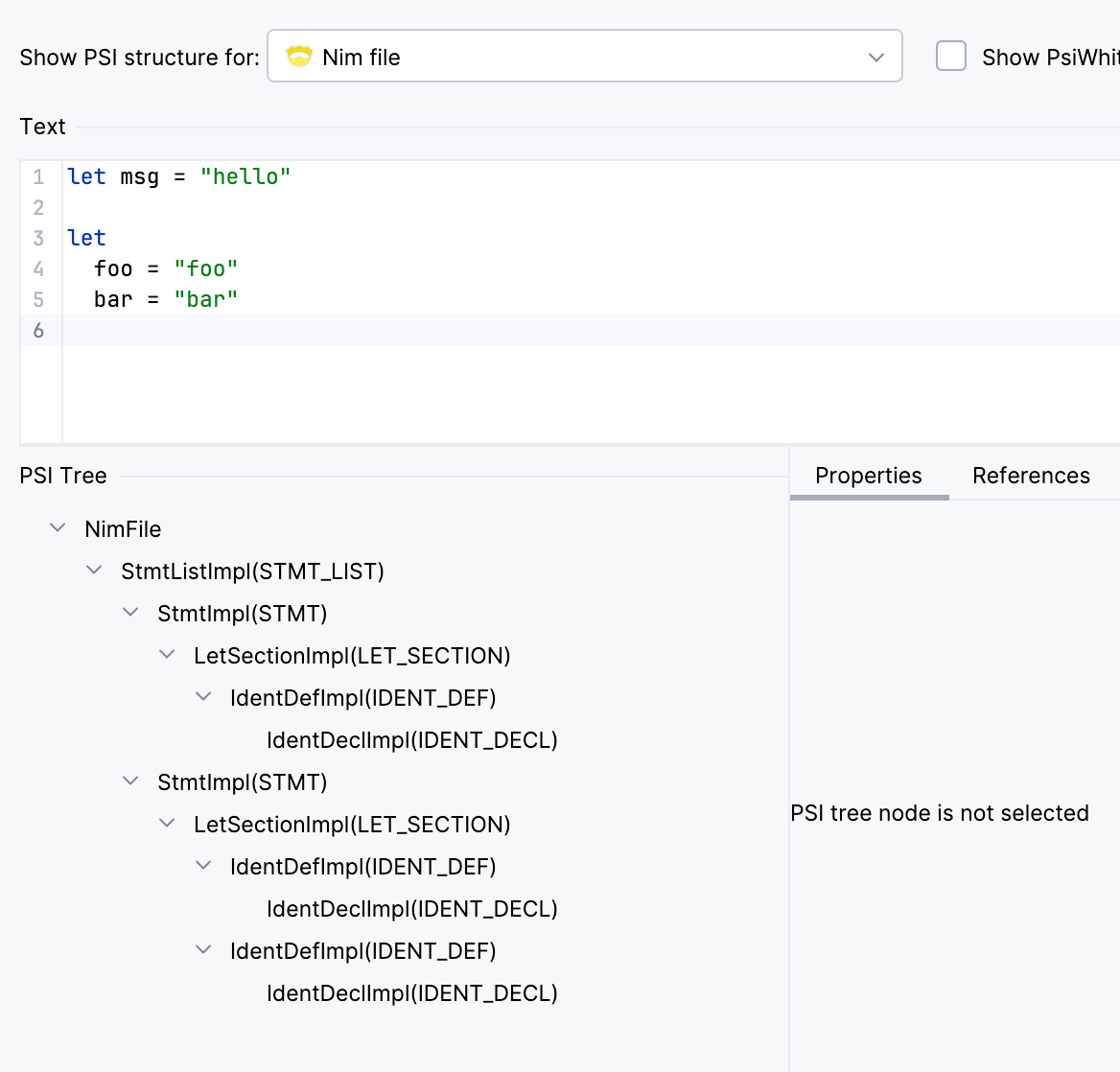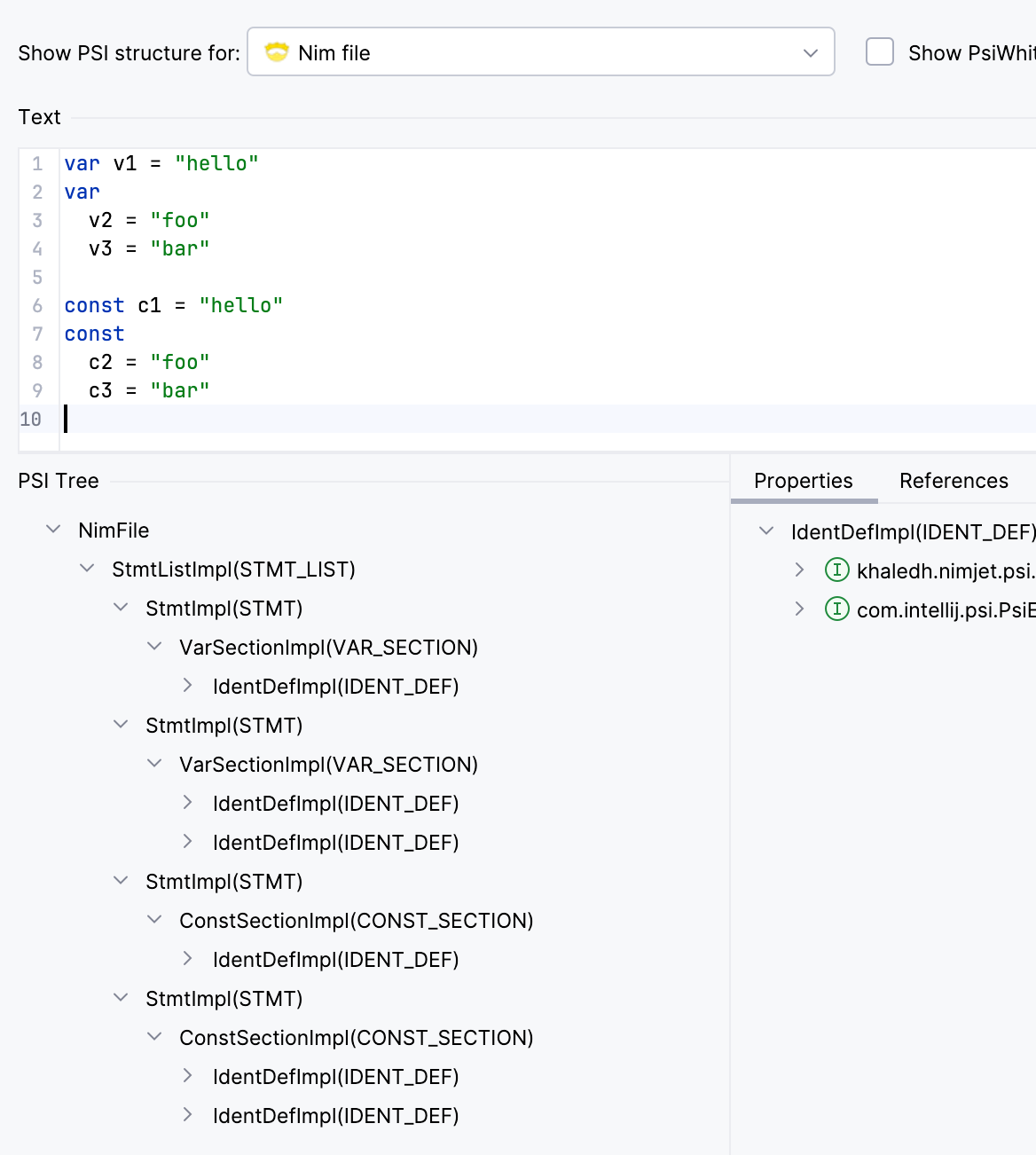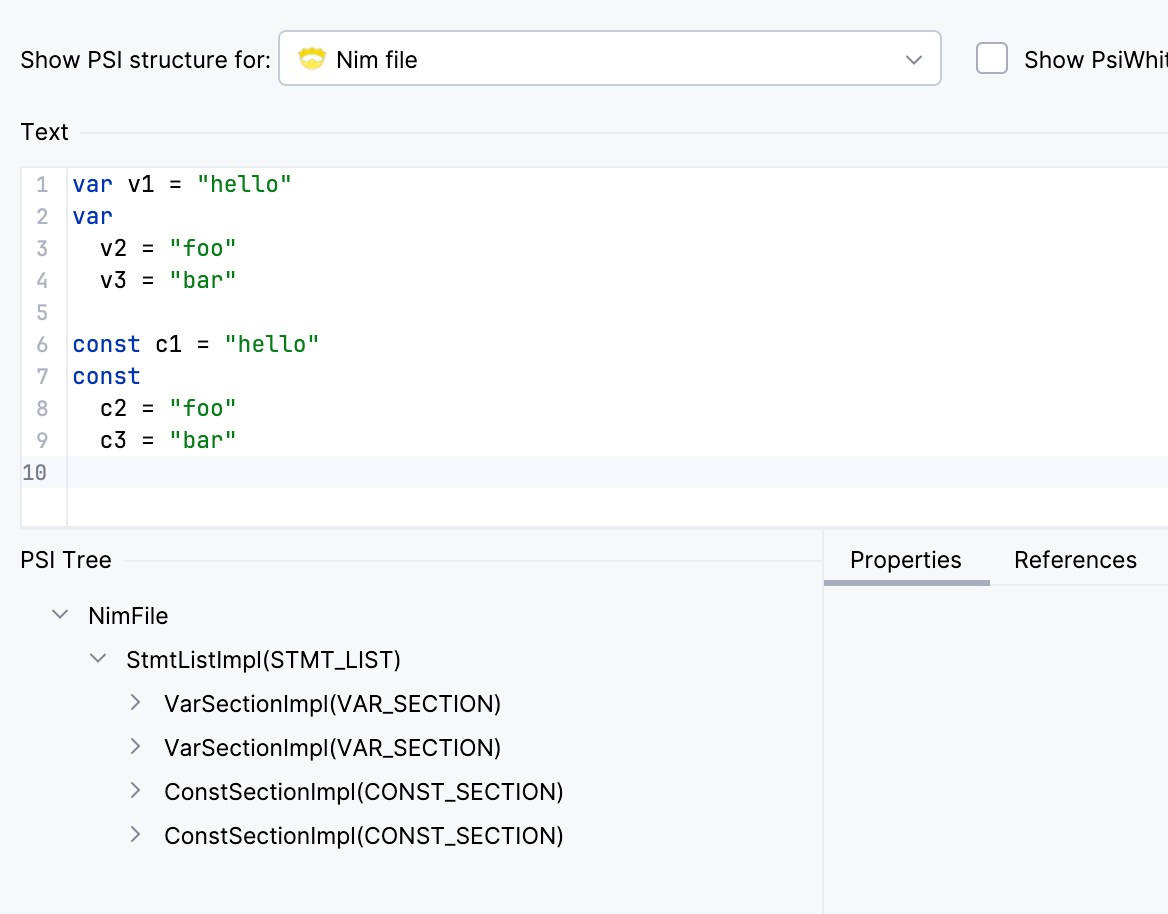Declaration Sections
In addition to declaring single variables in a declaration statement, Nim also supports declaring multiple variables in the same statement using an indented section. For example:
let msg = "hello" # single declaration
let # multiple declarations
foo = "foo"
bar = "bar"
Now that we have support for indentation in the grammar, we can easily modify the LetSection rule to support multiple declarations, in addition to the existing single declaration.
// src/main/kotlin/khaledh/nimjet/parser/Nim.bnf
...
LetSection ::= LET IdentDef
| LET IND IdentDef (EQD IdentDef)* DED
IdentDef ::= IdentDecl EQ STRING_LIT
...
The LetSection rule now has an alternative that allows multiple declarations in an indented section, where declarations in the section are separated by EQD. I factored out a common part of the two alternatives into a separate IdentDef rule to avoid duplication. Let's test it out.

This looks to be correct. The PSI tree shows two IdentDef nodes under the LetSection node. We are already reaping the benefits of the indentation support we added earlier, keeping the grammar clean and easy to read.
Let, Var, and Const Sections
Nim has three different kinds of variable declarations: let, var, and const. They all use the same syntax for declaration, but they have different semantics. Let's add similar support for var and const declarations in the grammar.
...
Stmt ::= LetSection
| VarSection
| ConstSection
| Command
| BlockStmt
LetSection ::= LET IdentDef
| LET IND IdentDef (EQD IdentDef)* DED
VarSection ::= VAR IdentDef
| VAR IND IdentDef (EQD IdentDef)* DED
ConstSection ::= CONST IdentDef
| CONST IND IdentDef (EQD IdentDef)* DED
...
Let's not also forget to add the var and const keyword tokens to the lexer and the NimToken class.
...
<YYINITIAL> {
...
"let" { return NimToken.LET; }
"var" { return NimToken.VAR; }
"const" { return NimToken.CONST; }
...
}
Let's test the new var and const declarations.

All seems to be working as expected.
Meta Rules
The LetSection, VarSection, and ConstSection rules are very similar. They only differ in the keyword token they use. We can factor out the common parts of these rules into a meta rule, which is a Grammar-Kit construct to define a parameterized rule (kind of similar to generics).
A meta rule doesn't define explicit parameters. Instead, it uses an implicit parameter <<p>> for rules that use a single parameter, or <<p1>>, <<p2>>, etc., for rules that use multiple parameters. To invoke the meta rule, you use the <<rule_name ...>> syntax, and pass other rules as arguments.
Let's define a meta rule for the variable declaration sections.
LetSection ::= LET <<section IdentDef>>
VarSection ::= VAR <<section IdentDef>>
ConstSection ::= CONST <<section IdentDef>>
private meta section ::= <<p>>
| IND <<p>> (EQD <<p>>)* DED
This is equivalent to the original rules we defined earlier, but with less redundancy.
Let's make another use of meta rules. We've seen the pattern <<p>> (EQD <<p>>)* before in the StmtList rule:
StmtList ::= Stmt (EQD Stmt)*
This pattern basically defines a sequence of items separated by a delimiter. We can factor this pattern into a meta rule as well, let's call it list, and use it both in the StmtList rule and the section meta rule (yes, meta rules can be nested).
StmtList ::= <<list Stmt EQD>>
...
private meta list ::= <<p1>> (<<p2>> <<p1>>)*
private meta section ::= <<p>>
| IND <<list <<p>> EQD>> DED
This time, the list meta rule takes two parameters: <<p1>> and <<p2>>. The first parameter represents the item to be repeated, and the second parameter represents the delimiter. We make use of it in the StmtList rule to define a repeated sequence of Stmt nodes separated by EQD. We also use it in the section meta rule to define a repeated sequence of <<p>> nodes separated by EQD.
Another pattern we can factor out is the IND ... DED pattern, which defines an indented block of code. Let's define an indented meta rule for this pattern. We'll use it in both the BlockStmt rule and the section meta rule.
...
BlockStmt ::= BLOCK COLON <<indented StmtList>>
...
private meta indented ::= IND <<p>> DED
private meta section ::= <<p>>
| <<indented <<list <<p>> EQD>>>>
If we test the grammar now, we should see no difference in the behavior, but the grammar is now much more lean and DRY. Here's the full grammar so far.
Module ::= !<<eof>> StmtList
StmtList ::= <<list Stmt EQD>>
Stmt ::= ConstSection
| VarSection
| LetSection
| Command
| BlockStmt
ConstSection ::= CONST <<section IdentDef>>
LetSection ::= LET <<section IdentDef>>
VarSection ::= VAR <<section IdentDef>>
IdentDef ::= IdentDecl EQ STRING_LIT
Command ::= IdentRef IdentRef
BlockStmt ::= BLOCK COLON <<indented StmtList>>
IdentDecl ::= IDENT
IdentRef ::= IDENT
// meta rules
private meta list ::= <<p1>> (<<p2>> <<p1>>)*
private meta indented ::= IND <<p>> DED
private meta section ::= <<p>>
| <<indented <<list <<p>> EQD>>>>
We'll make more use of meta rules in the future when we encounter more patterns that can be factored out.
PSI Cleanup
One last thing we can do to clean up the PSI tree a bit is to make the Stmt rule private. This rule doesn't serve any purpose on its own, other than to group other statement rules. Making it private will make the individual statement rules direct children of the StmtList node in the PSI tree.
private Stmt ::= ConstSection
| ...
Let's see what the PSI tree looks like now.

This looks much cleaner. The Stmt nodes are gone, and we can see the declaration sections directly under the StmtList node.